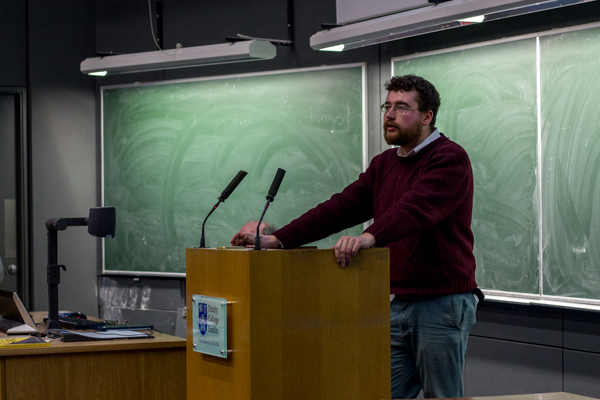In a seismic year for the Graduates Students’ Union, there was little sense of an election campaign likely to cause controversy, as candidates for president and vice-president set out their plans for the postgraduate union.
Despite this year’s GSU elections arguably being the most important in recent years, postgraduate students were seemingly not enticed to attend hustings this evening. The three candidates running for sabbatical roles outlined, before a crowd of no more than 30 people, how they intend to address the myriad of issues facing postgraduate students, with varying levels of success.
President
Uncontested presidential candidate Oisín Vince Coulter opened with a quip that he was a fan of “Soviet-style democracy”. Nobody in attendance was left in any doubt of his commitment to taking industrial action if his bid for office is successful. “A radical change and a paradigm shift” is necessary, Coulter told a muted audience. “There comes a time when you have to stand up from the table. We have strength in numbers. Enough is enough.”
Despite mentioning briefly his intention to improve paying conditions awarded to teaching assistants and his eagerness to enhance the supports and services currently available to postgraduates, fees dominated every aspect of Coulter’s speech this evening.
“GSU was founded by my mother in the early 1970s”, he stated, going on to account how she scheduled strikes that were immediately and profoundly successful. Listing “petitions, protests and occupations” as other activist tools he is happy to utilise to improve the plight of the postgraduate community, Coulter re-iterated again and again that “nothing is off the table”.
The single presidential candidate made it clear that he will not be reliant on the USI, criticising it for failing to “pay any attention to the postgraduate issues at the moment”. Instead, Coulter plans to approach national industrial bodies such as the Irish Federation of University Teachers (IFUT) and SIPTU: “I’ll meet with anyone who can help us advance our agenda.”
Vice-President
As the only contested race in this year’s GSU elections, this hustings was important for the candidates, giving them an early opportunity to gain a foothold in the race. Although neither candidate stormed ahead this evening, it’s clear that they’ll have to grapple with the major issues facing the GSU if they’re going to attract votes later this week.
During their pre-prepared speeches, both candidates spoke with a sense of ease and confidence before the small crowd. Outlining his manifesto points, Dr Gogoal Falia spoke slowly and calmly. He stressed the importance of promoting gender equality on campus, and reinforced his commitment to solving the issues facing international students.
Jamie Farrell, meanwhile, seemed slightly more nervous while fleshing out his manifesto points, continuing the themes of community and commitment he’s pushed to the fore this week. He raised somewhat more achievable manifesto points than Falia, stressing his impressive experience and “long history of being engaged in student activism”.
During the question-and-answers section of the evening, Falia fielded questions with a sense of self-confidence, but seemed evasive and ill-informed at times, admitting that he didn’t know how many off-campus locations existed and responding to one question with a coy “I have something in mind but won’t tell you what”. Farrell responded well to questions, drawing on his own past experience throughout his answers. If Falia’s answers were at times more nebulous, Farrell took a rather down-to-earth approach, promising achievable solutions to the issues presented by the crowd.
While many would have expected the issue of postgraduate fees to dominate tonight’s proceedings, Falia addressed it only briefly towards the end of his speech, promising to “continue the struggle” to fight fee increases, but notably offering no tangible examples of how he hopes to achieve this. Farrell gave fees a more comprehensive treatment, pledging to increase transparency through fixed contracts, but acknowledging that an end to fee increases may be difficult to negotiate.
While tonight’s hustings may have lacked the hustle and bustle of the earlier Trinity College Dublin Students’ Union (TCDSU) elections, the steady performance of each of the candidates and the prevalence of pressing issues for postgraduate students show that GSU elections are not to be overlooked. The candidates may have left the evening relatively unscathed, but the starting pistol has well and truly been fired.







